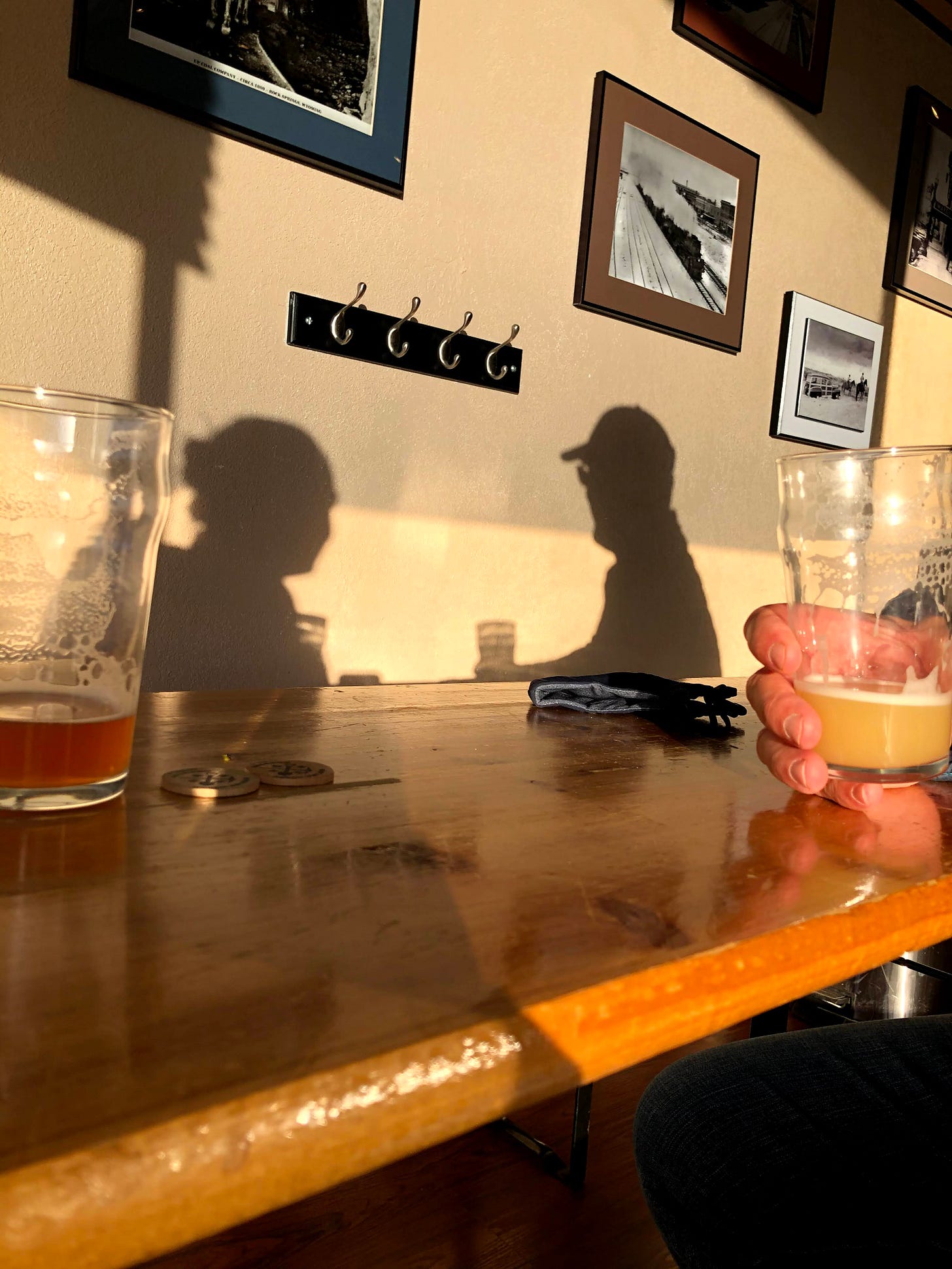Reciprocity
Thoughts on Friendship, Reading, and Writing
I talk about voice enough in this piece that I figured you deserved a chance to hear mine, if you choose. I’ve got a lingering chest cold, so I’m a little froggy.
I didn’t know many people at the city reception for volunteers, hosted at a local Thai restaurant, so I introduced myself to a tall woman with striking green eyes and made conversation. “What do you do for the city?,” I asked, and then “How long have you lived here?” and “What do you most like about our town.” Stuff like that. She wasn’t hard to get started ... but I soon noticed that I was on a one-way street. She was happy to talk about herself; she had no curiosity about me. It wasn’t a conversation, it was a monologue. I made a quick exit.
Just as I turned away from this narcissist I met at a party, I tend not to stick with writers who believe they have the answer, that they are dispensing the truth. Or the ones who are peddling a Substack growth plan or perhaps an obsession with their insecurities that they could never exhaust. These are not the writers for me!
As a writer of personal essays, I live in horror of being that guy, the one who thinks he sits at the center of the world. I don’t want to proclaim, declare, or scold. God forbid I use the word “should.” I run into writers who want to tell me how it is, to dragoon me into seeing the world their way. I may read an essay or two, but eventually I’ll walk away.
I don’t mean to sound unsympathetic. I’ll give a mulligan, even two, to anyone who needs to get off their chest the pain associated with the terrible solitude of being a writer, a creative, in today’s growth-focused, influencer-ridden, enshittified digital environment. There are times when people need to unload. But if you make your woes—or, for that matter, your self-promotion or self-absorption—the driving force behind your writing, you’ll soon lose me.
As a writer of personal essays, I try to write about myself while simultaneously effacing myself, thus treating my subject (that is, me) not as something important in itself but only as an invitation to a deeper and, ideally, shared understanding. In this way, I try to use the personal essay as a means of opening a conversation, either “real” (meaning, via comments, email, or phone call) or in the mind of the reader.
I’m not saying I succeed; I’m saying I try.

What I’m after is reciprocity. When I sense a potential for friendship in real life I wonder: Is this person as curious about the world as I am? Can we, via our mutual interest in each other or in each other's interests, create a shared space for understanding?
Some people are not terribly interested in reciprocity, in learning from each other. They want to talk about themselves; they just happen to like an audience. [Of course, there are alternative explanations: perhaps they are just too insecure to open themselves to reciprocity, and they use narcissism to shield themselves from the risk of others knowing them. I’m sure there are more.]
I’m looking for reciprocity from those I read as well, though of course this medium of exchanging views forces a different variation on reciprocity. Writing, like so much creative work, is a solitary act, the act of a person describing or reacting to the world. Publishing one’s writing is a way of saying, “here’s what I think, here’s what I see.”
And yet the kind of writers I like most manage to communicate their openness to conversation, their humility. “They are vulnerable to the legitimacy of others’ opinions,” my friend Bill Mester, the king of reciprocity, used to say. Such writers speak to their readers as friends, they confide their thoughts as if within the cocoon of a conversation. They disclose their thoughts as if testing them out, offering them for consideration. They seek reciprocity.
My thoughts about reciprocity are all tangled up with how I write and read personal essays: the voice with which I write my essays, and the feeling of intimacy and understanding I get when I read a good personal essay. I think the personal essay has the capacity to create a communicative space that feels much like friendship, and I feel this both as a writer and a reader.
Thom Hartmann shed some insight on the peculiar intimacy of the writer/reader relationship when he described something copywriter Joe Sugarman related in a webinar:
“Most people make the number one writer’s mistake when they start.[...] They think they’re talking to an audience. But there’s never an audience. Instead, people read everything from books to articles to ad copy one at a time. Each person is reading each word you write, sounding them out in their own heads, all alone.”
Knowing that every act of reading is a one-to-one relationship between writer and reader, his advice was to write as if you were addressing a friend, in a style that’s personal and conversational.
I often tell people I read and write to understand what I think, but it’s more than that, really. Otherwise, why would I share it with the world? This act of thinking and understanding doesn’t happen in isolation. It happens with others, others I read, others who read my writing, and it evolves in the conversations that ensue. The reading and the writing become meaningful in the context of the fellowship and, yes, even the friendships that form as a result.
Here’s how I approach writing an essay: I have an issue I’m trying to untangle, and I find the best way for me to figure it out is to, well, talk about it with you. So I untangle the knot in front of you, and if I do it well, with enough candor to convince you of my honesty, and with enough humility and openness to being wrong, you’ll respond with thoughts of your own, and when we hold this idea between us, turning it in our collective hands, we’ll come to an understanding that we’ll both find satisfying.
I look for these same qualities in those I read: an approach to the world that invites me in and allows me room to think. A way of sharing their experience that feels refreshing and authentic and invitational. When I find others who invite being read this way, it’s very inspiring.
A couple examples: the story “My Personal Myth,” by david roberts, sparked my thinking about my own personal myth, and also about how one writes from a position of “privilege” without being insufferable, something he does with great grace; I can trace the impact of his thinking in this piece and in another soon to follow. And Henrik Karlsson’s capacity to examine his own thinking is an ever-present reminder that this can be done without a trace of self-absorption or narcissism. My writing is in conversation with theirs.
And, if I’m lucky, with yours my friend.
In the early drafts of this piece—and Sara will tell you, there were many!—I mused about the nature of my real life friendships and how they compared with those formed in the exchange of written ideas. But I cut all that out! Perhaps these few pictures will tell the tale:






I'd never considered I'm actually writing to an audience of one, so thanks for that. It helps me consider my own authenticity and this idea that I should be speaking as if to an audience of one.
On the idea of reciprocity in person it does take practice and self awareness. About 10-15 years ago I recognized I was monopolizing conversations with trite sarcastic responses to try and interject humor. I wasn't really listening. Now I actively speak in my head "shut up and listen". Because they may just need to get something off their chest.
It also took recognizing that other people aren't naturally trained to listen, which means trained to ask questions. It's that natural curiosity you discussed. You can do an experiment next time and relate an anectdote similar to their own. Share something in response that requires them to ask a question. If they don't or continually parrot their own response to your response, then you know it's not going to be reciprocal.
Thanks for sharing your thoughts, Tom!
Great essay, as usual Tom. Plus, you've introduced me to some other great writers, so thanks for that! (I'm climbing back out of that pleasant rabbit hole now to reply to this... lol)
You've given me a lot to think about. I try to approach my how-tos as suggestions rather than edicts from on high. That's how it always goes in my head: "here's something you can try" rather than "this is what you should do". I also use "this is what worked for me" wherever possible. However, I'm sure I've used "should" somewhere in there. (I'm too scared now to look...)
It's tough, though. It's difficult to give advice without seeming condescending or didactic, I've found.
Just a couple of days ago, I read this thread on Reddit about what the OP calls "Social Media Writing Advice". (https://www.reddit.com/r/writing/comments/1b9q2r7/social_media_writing_advice_sucks_agree_or/) The question posed about whether or not it sucks both intrigues and repels me. I wanted to answer, but I didn't know which thread to pull.
I agree in principle that didactic writing in general is not a good thing. But don't some people *want* to just be told how to do a particular thing? If I go to YouTube to find out how to fix my dishwasher, then I very much want someone to say 1, 2, 3 -- this is how you do it. Aren't there some beginner writers out there who want the same thing? Or is it different because it's art versus an engineered piece of equipment?
This angst is compounded by my self-awareness that I can come off as overbearing sometimes (see your previous post on assholism...). In reality, I hate the idea of manipulating people into a certain action. But sometimes I get passionate about particular topics, which I know can come off as trying to do just that...
In any case. I still don't have a comprehensive answer to the whole "helpful hints" vs. "didactic one true path" question. I think both viewpoints are valid, even if I do try to lean towards the "helpful hints" side of the spectrum. At least in intent.
More to chew on...
BTW, I couldn't figure out the symbolism of the coat rack in your first photo. Does it mean that the two of you are "on the hook" with each other for the rest of your lives or that, being and empty coat rack, your relationship is "off the hook"? Enquiring minds want to know...